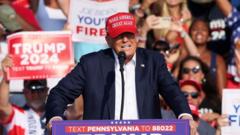The escalating tensions between Brazil and the United States have reached a new height as President Lula responds to Trump’s tariff threats stemming from the legal trials of ex-President Bolsonaro. Lula emphasized Brazil's sovereignty and rebutted Trump's claims about trade deficits, suggesting the ongoing political battle could bolster his domestic standing.
Brazil's Lula Promises Retaliatory Tariffs Amid Trump’s Threats

Brazil's Lula Promises Retaliatory Tariffs Amid Trump’s Threats
Brazilian President Luiz Inácio Lula da Silva has vowed to implement reciprocal tariffs in response to the potential 50% levy proposed by U.S. President Donald Trump.
Brazilian President Luiz Inácio Lula da Silva has issued a strong warning of retaliation to U.S. President Donald Trump's recent threat to impose a 50% import tariff on Brazilian goods effective August 1. The dispute centers around Trump’s criticism of Brazil's legal treatment of former President Jair Bolsonaro, who faces charges of attempting to stage a coup following his electoral defeat by Lula in 2022. In a letter to Lula, Trump described Bolsonaro as "a highly respected leader throughout the world" and called for an end to what he termed a "witch hunt" against Bolsonaro.
Lula's response was emphatic, asserting that Brazil, as a sovereign nation, would not submit to any form of external control. He announced that Brazil would introduce reciprocal tariffs on U.S. products if Trump moved forward with the proposed tariff increase. As the United States is Brazil's second-largest trading partner after China, such a significant tariff increase could potentially lead to severe economic repercussions for both nations.
In addition to addressing the tariff issue, Lula also challenged Trump's claim of a trade deficit, providing data that suggest the U.S. had a substantial trade surplus of $7.4 billion with Brazil in 2024. Brazil’s imports from the U.S. include mineral fuels, aircraft, and machinery, while it exports gas, iron, and coffee to the U.S.
Moreover, Trump’s letter was not solely focused on tariffs; he also criticized Brazil for implementing "secret and unlawful censorship orders" impacting U.S. social media platforms. In defense of these rulings, Lula justified them as necessary protections to combat hateful content and uphold democratic values.
Political analysts highlight that while the heightened tensions could be damaging, they might inadvertently strengthen Lula’s standing domestically, as historical precedents indicate leaders opposing Trump have enjoyed increased support at home. Future responses from Lula's government will likely determine the extent of the impact from this ongoing diplomatic conflict.




















